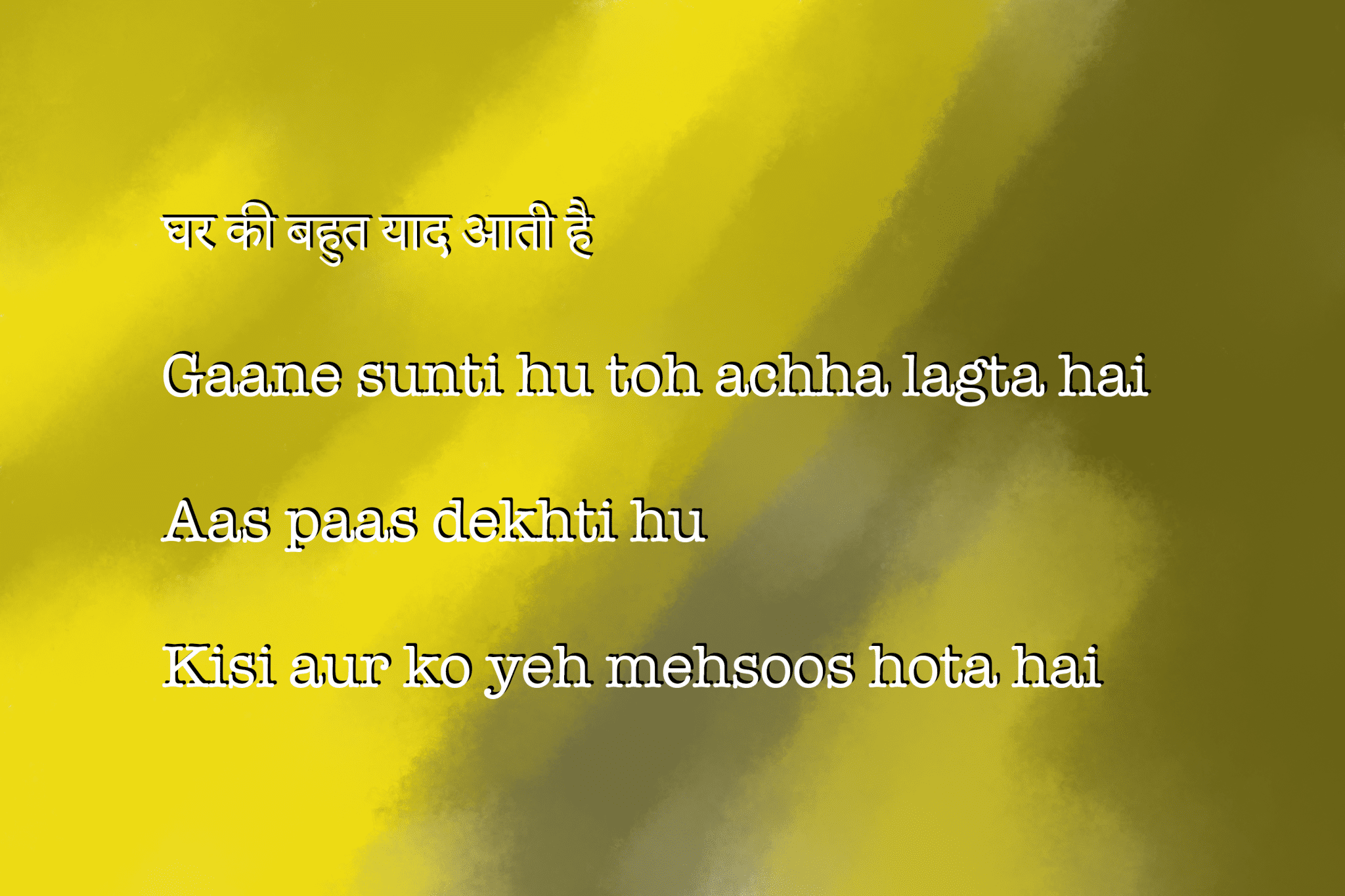घर की बहुत याद आती है
Gaane sunti hu toh achha lagta hai
Aas paas dekhti hu
Kisi aur ko yeh mehsoos hota hai kya?
I begrudged studying Hindi at school. It made no sense to me; why was I being made to learn multiple पर्यायवाची (synonyms) of random words I would never use? Having recently moved back from Mauritius in year 5 (or standard 5 as we called it), I dealt with the daily reminder that I was behind everybody in my class in Hindi. I did not understand where the maatras were supposed to go. Learning to differentiate between Chhoti ‘e’ ki maatra and baddi ‘E’ ki maatra confused the living daylights out of me.
My Hindi teacher, Manju Ma’am, had a long black braid that she would fling from side to side as she selected a student to recite their पर्यायवाचीs to the class. I would freeze with fear every time her eyes met mine — which seemed to leave no doubt in her mind to pick me. I fumbled, choked, swallowed and spoke too softly to be heard. She stared, scoffed and scolded. I sat back down. Manju ma’am disliked me from the get go; from the first time she heard my Mauritian Creole accent. Every time I opened my mouth her brows would furrow and eyes would roll as if to say: you’re not Indian enough.
I wasn’t an easy student either, I simply refused to learn my क , ख , ग, घs (the alphabet song we were taught in standard 1). I hated it.
On returning home from school, I would cry for hours. I felt deeply ashamed that I did not know the language that my friends and family seemed to navigate with ease. One night, I earnestly prayed to god that Hindi as a language would cease to exist and I would be free of the fear of not knowing, the shame of not fitting in and the disdain of Manju Ma’am. I asked my parents if I could change schools, and found, to my horror, that every school taught the language. I couldn’t seem to get rid of this awkwardly-strung-together set of consonants and strange sounding notes.
That’s how my relationship with हिंदुस्तानी began.
As the years proceeded, I decided to dive in headfirst. Hindi was everywhere; on every street sign, every haggle with every street vendor. She even haunted my dreams. I couldn’t avoid her anymore.
I focused, I practised and I learnt everything I could about Hindi. Except, of course, the basics; I avoided learning my क , ख , ग, घs at all costs. I lost my way around some incredibly complex words and eventually knew my way around all the maatras and bloody dots. During my vacations, my grandfather would teach me the ins and outs of the language. He taught me that nobody spoke pure Hindi anymore- what we spoke was Hindustani; an amalgamation of Hindi and Urdu.
By standard 9, I had mastered the language. I even debated in Hindustani!
As I grew older I began learning about the politics of the language — how exclusionary it is. The complexities, the conflicts and crises that many associated with it.
It all felt too much
I did not want to identify with a language that divided;
Religion from religion
Culture from culture
Class from class
Caste from caste
मातृभाषा
I wondered how many people thought of Hindustani as their mother tongue and how many felt, instead, the pang of loss and hurt.
At 18, I moved to Sydney to study. It felt freeing to start afresh; to let go of all that did not align with my values. Out of everything I thought I would miss (consisting mostly of oddly specific street food), I did not expect to miss hearing the specific phonetics of Hindustani consonants.
Perched above my experience and privilege of not needing her anymore, I have completed three years at University not having written a word from the Devanagari script.
Last night I rang my grandfather in hopes that speaking with him in Hindustani would inspire me to get started on my ACAR Honi article.
He recited a ghazal for me and asked me to explain its meaning.
I fumbled, choked, swallowed and spoke too softly to be heard.
He laughed and exclaimed, ‘mother divine, तुम अपनी मातृभाषा भूल गई हो!’
‘It’s okay.’
In an attempt to make the harsh truth palatable, I swished my tongue around my mouth to enunciate words in Hindustani that use combined and binary consonants unique to the language.
I miss her.
I miss the way my hands moved when I wove the tapestry of her क , ख , ग, घs on paper.
Still standing vehemently opposed to learning my क , ख , ग, घs.
Lekin घर की बहुत याद आती है
मातृभाषा: Mother tongue
घर की बहुत याद आती है: I miss home a lot
तुम अपनी मातृभाषा भूल गई हो!: you have forgotten your mother tongue!





